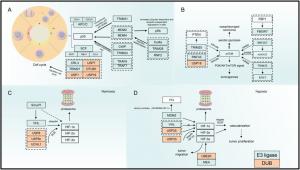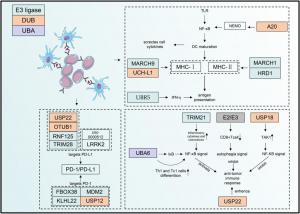Unveiling the Role of the Ubiquitin-Proteasome System in Cancer Progression and the Tumor Microenvironment

The UPS regulates the TME. (A) E1 ubiquitin-activating enzyme activates the carboxyl group of the C terminus of ubiquitin in an ATP-dependent manner through the formation of high-energy thioester bonds.
A new review explores the pivotal role of the ubiquitin-proteasome system (UPS) in regulating the tumor microenvironment (TME) and driving cancer progression.
SHANNON, CLARE, IRELAND, February 23, 2025 /EINPresswire.com/ -- A new review published in Genes & Diseases explores the pivotal role of the ubiquitin-proteasome system (UPS) in regulating the tumor microenvironment (TME) and driving cancer progression. The study provides novel insights into how ubiquitination and deubiquitination impact tumor cells, immune responses, and potential therapeutic strategies for cancer treatment.
The tumor microenvironment is a complex ecosystem of tumor cells, immune cells, and non-cellular components, creating a dynamic interplay that influences cancer development. The study highlights that ubiquitination, a key post-translational protein modification process, is essential for maintaining protein stability and regulating various cellular processes such as cell growth, DNA replication, immune responses, and energy metabolism.
One of the key findings of this review is how the UPS system controls tumor cell proliferation, immune evasion, and metastasis. Multiple E3 ubiquitin ligases and deubiquitinating enzymes (DUBs) that regulate essential cancer-related proteins were identified. For instance, the study outlines the role of MDM2, an E3 ubiquitin ligase that targets p53, a well-known tumor suppressor protein. Dysregulation of MDM2 leads to uncontrolled tumor growth, making it a promising target for anti-cancer therapy.
Furthermore, the study delves into the UPS’s impact on immune cells in the TME. Ubiquitination modifications can either promote or suppress immune responses, directly affecting cancer immunotherapy outcomes. The review discusses how targeting PD-1/PD-L1 ubiquitination can enhance T-cell-mediated anti-tumor immunity, a critical finding for improving checkpoint inhibitor therapies.
The authors also explore how the UPS influences non-immune components of the TME, such as tumor-associated fibroblasts (CAFs), macrophages, and the extracellular matrix (ECM). By regulating protein degradation and signaling pathways, the UPS contributes to angiogenesis, metabolic reprogramming, and tumor cell migration. These findings open new avenues for developing UPS-targeted drugs that could disrupt cancer-supportive environments.
While the therapeutic potential of targeting UPS is immense, this review also acknowledges the challenges of developing effective inhibitors. Existing UPS-targeted drugs, such as proteasome inhibitors (bortezomib, carfilzomib), have shown clinical success in treating multiple myeloma. However, new strategies, including PROTAC, aim to enhance specificity and reduce toxicity in solid tumors.
This study underscores the UPS as a critical regulator of cancer progression and a promising therapeutic target. Future research will focus on developing selective inhibitors and combination therapies to improve cancer treatment outcomes.
Reference
Yulan Huang, Yuan Gao, Zhenghong Lin, Hongming Miao, Involvement of the ubiquitin-proteasome system in the regulation of the tumor microenvironment and progression, Genes & Diseases, Volume 12, Issue 2, 2025, 101240. https://doi.org/10.1016/j.gendis.2024.101240
Funding Information:
National Natural Science Foundation of China (No. 82173134)
Chongqing Fund for Outstanding Youth (China) (No. CSTB2022NSCO-JOX0010)
# # # # # #
Genes & Diseases publishes rigorously peer-reviewed and high quality original articles and authoritative reviews that focus on the molecular bases of human diseases. Emphasis is placed on hypothesis-driven, mechanistic studies relevant to pathogenesis and/or experimental therapeutics of human diseases. The journal has worldwide authorship, and a broad scope in basic and translational biomedical research of molecular biology, molecular genetics, and cell biology, including but not limited to cell proliferation and apoptosis, signal transduction, stem cell biology, developmental biology, gene regulation and epigenetics, cancer biology, immunity and infection, neuroscience, disease-specific animal models, gene and cell-based therapies, and regenerative medicine.
Scopus CiteScore: 7.3
Impact Factor: 6.9
# # # # # #
More information: https://www.keaipublishing.com/en/journals/genes-and-diseases/
Editorial Board: https://www.keaipublishing.com/en/journals/genes-and-diseases/editorial-board/
All issues and articles in press are available online in ScienceDirect (https://www.sciencedirect.com/journal/genes-and-diseases ).
Submissions to Genes & Disease may be made using Editorial Manager (https://www.editorialmanager.com/gendis/default.aspx ).
Print ISSN: 2352-4820
eISSN: 2352-3042
CN: 50-1221/R
Contact Us: editor@genesndiseases.com
X (formerly Twitter): @GenesNDiseases (https://x.com/GenesNDiseases )
# # # # # #
Genes & Diseases Editorial Office
Genes & Diseases
+86 23 6571 4691
email us here
Legal Disclaimer:
EIN Presswire provides this news content "as is" without warranty of any kind. We do not accept any responsibility or liability for the accuracy, content, images, videos, licenses, completeness, legality, or reliability of the information contained in this article. If you have any complaints or copyright issues related to this article, kindly contact the author above.


